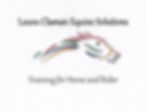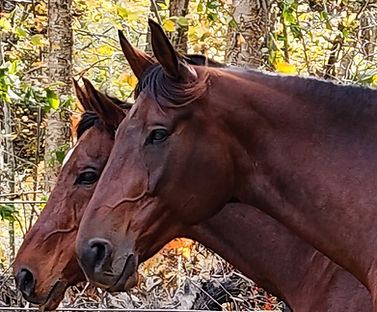Notes from Laura's desk
- Laura Claman
- Jan 6, 2018
- 5 min read

I have a heavy background in education and psychology. Luckily, it turns out that a horse trainer needs all of these skill sets. I have incorporated many of the best educational practices into the training of riders and horses. Let’s use a new horse to work with. In the very beginning, I get a history of the horse from my first meeting with the new client. It’s important to know about past injuries, incidents, living situation (in a large herd or box stall), and past uses and experience. I need a base line for the horse physically, educationally (how much training), what type of training, what is he eating, what is his current environment, and how does he behave in groups, alone, and in other various situations. This is all done verbally at first. It is very helpful in understanding the current dynamics of the horse and owner relationship.
Next, I meet the horse. From this first meeting and “interview” the owner and I put together an instructional plan. It’s usually a 3-month plan with goals for what we’d like to accomplish in that time. We set goals for the horse and goals for the rider. In the classroom, we call this an IEP, Individualized Educational Plan. I found that riders tend to just ride with no purpose. Why are your riding? What do you want your horse to do? These are important questions to know the answers to now. Not four years later- I wish I had a barrel racer. They feel like they are stuck with one type of riding and that’s it. Let’s see what suits you and your horse the best.
From that moment on, my actions are dictated by the way the horse reacts to me. I have to say, it’s difficult to put into words. I watch the way the horse watches me as I walk towards him. I don’t want to just barge into their space. I ask permission to come closer with my body and maybe my voice. I am constantly evaluating the horse’s demeanor – does he like the voice or not? Some don’t, so I shut-up. Once the horse is comfortable with me by their head, neck and shoulders, I bring them to some cross ties and brush them.
Yes, the trainer brushes the horse. I’ve written about the importance of brushing before, but for those that haven’t read that post, this is a great time to get to know a horse. You get to know if they’re sensitive, easy going, playful, stubborn, lots about their personality as well as getting to know more about them physically.
Gigi didn't like flies on her of course. You can see how smart she is even through the fly mask. Here we are doing a leading exercise I call "my lane, your lane".

Now, Gigi used to think it was funny to reach around to take a nibble on me when I picked her front feet. She has a huge personality. This horse wants to be on stage. She’s a diva, but such a wonderfully smart and talented diva.
Brushing Darwin is another story. I don’t know much about his history except that he is from out west. Whatever this horse went through, he came out the other end stronger than ever. He will stand ground tied for body brushing. He feels very vulnerable when he has a foot up in the air. That’s a trust issue – don’t ever hit a horse for that. He likes the hose but not the fly spray bottle at first. When I first started working with him, he wouldn’t stand for mounting, he flipped his head so high it came close to my face, and he was a bundle of nerves ready to explode. So here’s where I want to talk about two things: hands and energy levels.
Energy Levels
I haven’t invented anything new in this area, but it’s important to understand that this goes both ways. When I work with Darwin, I keep my energy level very low and chilled out. This reaffirms the herd is safe. My motto is “be the calming member of your herd”. Another horse I ride, Twist, is the opposite. He is very smart, but he gets bored. If he doesn’t like you because you’re bullying him or who knows why, he will not move. I mean really not move no matter what whip, spur, swear you use. In order to ride this horse you have to make it seem like it’s a big party, and it’s super exciting, and we are going to have fun, together! He can be exhausting. There are also horses that can change, even within the same ride. Be aware of what your horse is telling you! My horse, Tag (Timely Writer), can be Jekyl and Hyde. He’s not the horse for everyone, or maybe no one except me. He’s so awesome though because no matter what, it seems like I just think what I want and he does it. I digress…
Hands
Let’s get back to Darwin’s flinging head for a moment. From what I can gather, whatever small amount of riding he’d had was western probably with a long-shanked curb bit. We put him in a French snaffle. (Not that the bit matters – it’s the consistency of an independent hand that doesn’t balance on the horse’s mouth). Night and day. Well, we knew his teeth were very good. There were no physical reasons for him to do this, and he only did it under saddle. When a good deal of your staff has English riding background, they can be reluctant to have a loose rein on a hot horse, but that’s exactly what you had to do. When we first got him, you couldn’t touch his mouth. I did put a standing martingale on him because I didn’t want anyone to get a broken face. When I turned my focus to him, he really appreciated the freedom I gave him with my hands. I had a subtle feel that was so soft it was barely there. He could feel it though and learned to trust its consistency. This consistency of hands and softness is paramount to a positive and soft connection with your ‘friend’. Charles de Kunffy writes in Creative Horsemanship, “…he will gently hold hands with you”. Soft, consistent, patient.
No more head flinging for Darwin, He is a soft and wonderful ride with great eventing potential. I love this horse so much. I love Twist and Gigi too! Every horse is so unique and special. I eventually fall in love with every one of them because we respect each other’s efforts put in to the working relationship. We have an appreciation for one another. I have been gifted the amazing rapport with so many wonderful horses because I fell in love with them all!

https://www.lauraclamanequinesolutions.com/ Somers, Connecticut
Be the calming member of your herd

